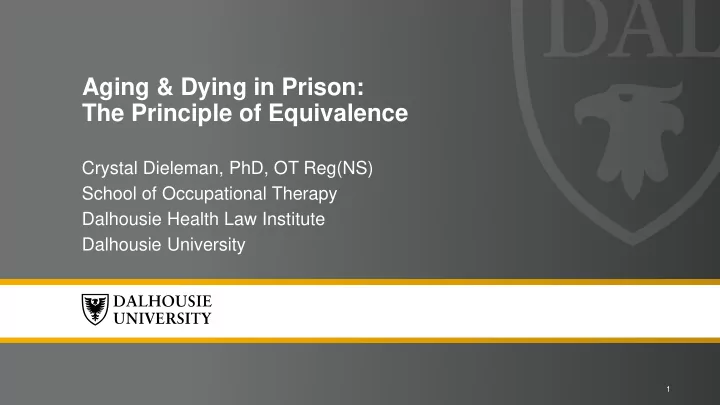

Aging & Dying in Prison: The Principle of Equivalence Crystal Dieleman, PhD, OT Reg(NS) School of Occupational Therapy Dalhousie Health Law Institute Dalhousie University 1
Outline • What is the principle of equivalence? • How is the principle of equivalence represented in Canada’s federal correctional legislation and policies? • Where are community standards of care established in Canada? • How is the principle of equivalence undermined or subjugated by Canadian correctional policy structures? C. Dieleman, End of Life Conference, 2017-09-15 2
Duty of Care “In periods of economic difficulty sacrifices have to be made, including in penitentiary establishments. However, regardless of the difficulties faced at any given time, the act of depriving a person of his liberty always entails a duty of care which calls for effective methods of prevention, screening, and treatment. Compliance with this duty by public authorities is all the more important when it is a question of care required to treat life-threatening diseases .” • UNODC: Standard Minimum Rules for the Treatment of Prisoners (2015) aka : the Nelson Mandela Rules C. Dieleman, End of Life Conference, 2017-09-15 3
Duty of Care • The judicial authority must assume a duty of care for the people in their custody. • The overall dependence of prisoners on staff for all aspects of their daily lives must be understood by all staff since they share the duty of care with the judicial authority. • Prisoners retain ALL HUMAN RIGHTS other than their freedom, which means their right to health care is not diminished in any way. • • WHO: Prisons & Health (2014) C. Dieleman, End of Life Conference, 2017-09-15 4
Standard Minimum Rules: Health-Care Services • Prisoners should enjoy the same standards of health care that are available in the community , and should have access to necessary health- care services free of charge without discrimination on the grounds of their legal status • Health-care services should be organized in close relationship to the general public health administration and in a way that ensures continuity of treatment and care • UNODC: Standard Minimum Rules for the Treatment of Prisoners (2015) aka : the Nelson Mandela Rules C. Dieleman, End of Life Conference, 2017-09-15 5
The Principle of Equivalence in the UK “Prisoners should receive the same level of health care as they would were they not in prison – equivalent in terms of policy, standards and delivery.” • Health Advisory Committee for the Prison Service (UK) (1997) • Wilson (2004) C. Dieleman, End of Life Conference, 2017-09-15 6
The Canadian Context – Standards of Care • Nationally • Legislation • Eg: Department of Health Act, Controlled Drugs and Substances Act, MAiD, etc. • Professional Associations • Eg: Canadian Medical Association, Canadian Hospice Palliative Care Association • • Provincially • Legislation Specific to Each Province (numerous) • Professional Regulatory Colleges • Standards of practice, Practice guidelines C. Dieleman, End of Life Conference, 2017-09-15 7
The Canadian Context – Correctional Legislation 86 (1) The Service shall provide every inmate with (a) essential health care; and (b) reasonable access to non-essential mental health care that will contribute to the inmate’s rehabilitation and successful reintegration into the community. (2) The provision of health care under subsection (1) shall conform to professionally accepted standards . • CCRA (2016) C. Dieleman, End of Life Conference, 2017-09-15 8
Correctional Policy: CD 800 Health Services • The Regional Director, Health Services, will ensure: • the provision of health services to offenders in Correctional Service of Canada (CSC) institutions and in the community, in accordance with relevant legislation, professionally accepted standards, CSC policies and practice directives • Health services will be provided by: • health care professionals who operate within their scope of practice and competence, registered or licensed for practice in Canada and preferably in the province of practice. The Chief Psychologist, however, must always be registered in the province of practice • No specific mention of end of life care C. Dieleman, End of Life Conference, 2017-09-15 9
End of Life Care: Community vs. Correctional Standards • “The person is engaged in and directs his or her care, including deciding how family members will be involved.” • Canadian Hospice Palliative Care Association (2013) • “ Whenever possible , the decisions of the offender and family (with offender consent) regarding care will be respected.” • “Always take into consideration the decisions of the offender/substitute decision maker.” • Correctional Service of Canada (2009) C. Dieleman, End of Life Conference, 2017-09-15 10
End of Life Care: Community vs. Correctional Standards • “Hospice palliative care is most effectively delivered when provided by an interprofessional team of health care providers who are knowledgeable and skilled in all aspects of care within their discipline or practice.” • Canadian Hospice Palliative Care Association (2013) • Of the ‘formal core team’ of each Hospice Palliative Care team, only 3 of 9 members identified are health care professionals. • “If the offender agrees, aim to manage their care in their parent institution for as long as possible.” • The majority of additional health professionals are not available at most parent institutions. • Correctional Service of Canada (2009) C. Dieleman, End of Life Conference, 2017-09-15 11
Subjugating the Principle of Equivalence • Dual mandate of care and custody • Myopic vision on custodial mandate • Inconsistent and poorly informed care mandate • Inconsistencies and ambiguity in the care mandate are used to rationalize and justify a standard of care well below that in the broader community C. Dieleman, End of Life Conference, 2017-09-15 12
Recommend
More recommend